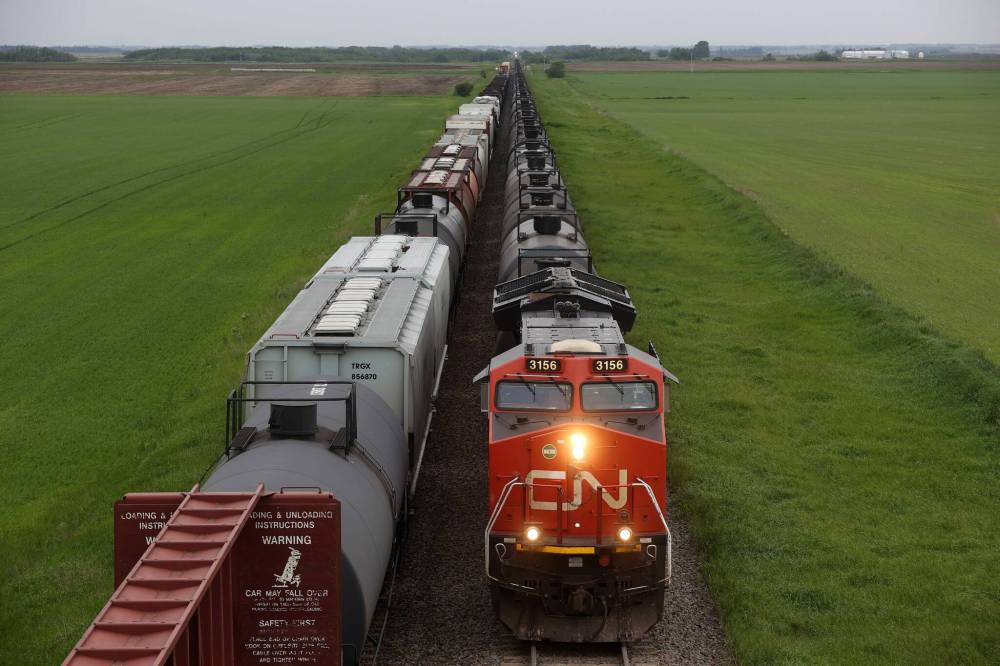Rail workers, grain growers await CIRB decision on potential strike
Advertisement
Read this article for free:
or
Already have an account? Log in here »
We need your support!
Local journalism needs your support!
As we navigate through unprecedented times, our journalists are working harder than ever to bring you the latest local updates to keep you safe and informed.
Now, more than ever, we need your support.
Starting at $15.99 plus taxes every four weeks you can access your Brandon Sun online and full access to all content as it appears on our website.
Subscribe Nowor call circulation directly at (204) 727-0527.
Your pledge helps to ensure we provide the news that matters most to your community!
To continue reading, please subscribe:
Add Brandon Sun access to your Free Press subscription for only an additional
$1 for the first 4 weeks*
*Your next subscription payment will increase by $1.00 and you will be charged $20.00 plus GST for four weeks. After four weeks, your payment will increase to $24.00 plus GST every four weeks.
Read unlimited articles for free today:
or
Already have an account? Log in here »
Hey there, time traveller!
This article was published 09/07/2024 (593 days ago), so information in it may no longer be current.
The possibility of a rail strike by Teamsters Canada members hangs in the balance as the union and grain growers who depend on rail service await a key decision by the Canada Industrial Relations Board (CIRB).
On May 1, Teamsters Canada members voted almost unanimously in favour of strike action if a deal with CN and CPKC could not be reached. The union was legally set to strike on May 22. However, the federal labour minister suspended the right to strike while the CIRB deliberates on which services or deliveries must continue if a strike occurs.
In the interim, the rail workers had to vote again to reauthorize strike action, as strike votes in federally regulated industries are valid for only 60 days. Once more, the members voted almost unanimously to authorize the strike.

Teamsters Canada spokesperson Christopher Monette said the board’s decision will determine the union’s next step, hoping the tribunal procedure won’t take too long.
“It would be hazardous for us to try to venture a guess. We hope the process will take weeks and not months, but the court will take the time it needs to make its decision. That said, we trust that the CIRB will make its decision promptly and do not believe they will uselessly delay,” Monette told the Sun on Monday.
“The rail companies, absent the threat of a work stoppage, have seen no reason to compromise or lessen their positions at the bargaining table,” he said. “Unfortunately, we’re still dealing with demands for concessions from both companies around issues like fatigue and scheduling, which we view as safety issues that affect our members and all Canadians.”
A strike can be avoided if both companies are reasonable, willing to compromise, and back off from their demands for concessions that the union believes could undermine rail safety in Canada, Monette said.
He said the goal of the union is to secure an agreement, not to strike, adding CN and CPKC need to realize that their labour relations strategy could significantly impact the Canadian economy unless they make a sincere attempt to reach a fair and equitable deal with their workers.
The ongoing labour dispute has also raised concerns across various sectors, particularly the agricultural industry.
Grain Growers of Canada executive director Kyle Larkin told the Sun its members rely on railway transportation to both deliver their crops to market and to procure crop inputs such as fertilizer.
“As we approach harvest, a rail strike means that farmers will be unable to deliver their grain to elevators,” he said. “This is because grain elevators have limited storage capacity at their facilities and farmers would be forced to keep the grain at their farms until rail movement begins.”
When farmers do not deliver grain, they are not paid and these payments are necessary to cover essential expenses like fuel, loans and insurance, he said.
As well, many farms do not have the capacity to store an entire harvest in bins, which can cause grain quality issues if it is stored outside.
“Unfortunately, grain movement does not begin Day 1 after a strike is resolved. It will take weeks to reposition train cars and begin shipments.”
Larkin said over half of what producers grow is exported to international markets and 90 per cent of grain moves by rail transportation, adding farmers do not have contingency plans.
The entire Canadian grain supply chain will grind to a halt if a strike occurs, he said, adding the group has been in conversations with federal government officials along with other industry counterparts for months, urging them to use the tools at their disposal to prevent a work stoppage.
Keystone Agricultural Producers president Jill Verwey said the potential strike would disrupt Manitoba’s agricultural logistics.

“Manitoba producers rely on railways to ship their products to market, as well as ensure the supply of key inputs for their farm operations such as potash, sulphur and fertilizer,” Verwey told the Sun.
“A labour disruption involving railway workers at both of Canada’s main railways would shock and harm an already fragile supply chain system, resulting in a negative impact on the movement of domestic agricultural product in Canada and food security for Canadians across the country.”
This could also result in Canada’s image abroad as a reliable provider of agricultural products being damaged, which in turn could see international customers seeking alternative markets, she said.
Keystone tasked all parties involved in the negotiations to work toward mutually beneficial agreements that would avert the possibility of a disruption in the Canadian supply chain, protect Canada’s image as a reliable provider of agricultural products and provide Manitoba producers with predictability for transportation of their products and inputs.
Larkin said many sectors apart from agriculture are also concerned.
“Many industries beyond agriculture rely on rail transportation and we have worked with colleagues across the mining, forestry, automaker and fuel sectors to urge the prevention of a work stoppage. We eagerly await a response from the CIRB on this topic,” he added.
Meanwhile, federal Labour Minister Seamus O’Regan Jr.’s press secretary, Hartley Witten, said the government does not have a clear timeline for the board’s decision.
“The board operates independently of the government,” he told the Sun on Monday. “Some decisions have been swift, while others have taken months. The minister continues to engage with all parties, alongside federal mediators, to reach a deal at the bargaining table.”
Regarding the potential economic impact if the strike proceeds, Witten said O’Regan is very interested in resolving the dispute at the bargaining table and is doing everything possible to ensure that happens.
» aodutola@brandonsun.com
» X: @AbiolaOdutola
